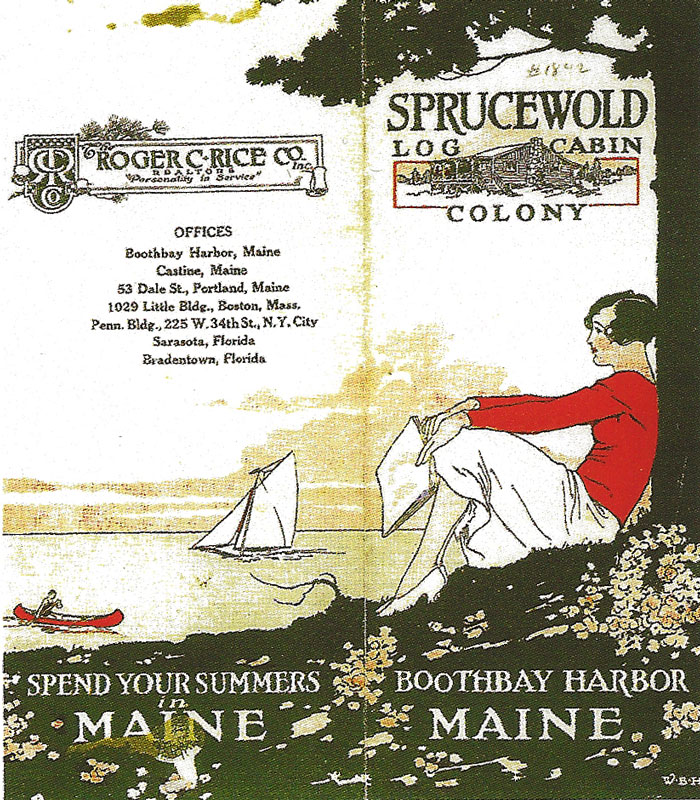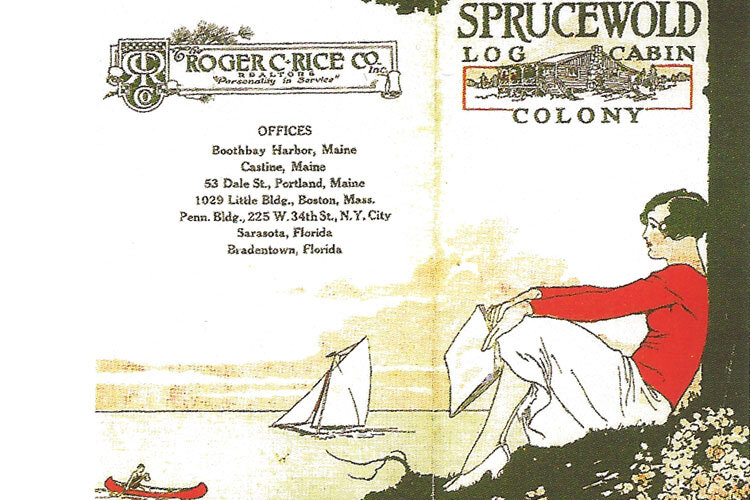Treasures of a Rustic Summer Colony
Lookout tower at Sprucewold
Summer colonies exist all across the country, usually situated on a fabulous tract of land near a lake, mountain or seaside. Unlike a resort community (Lake Tahoe, Jackson Hole, Myrtle Beach) that is a regular municipality whose natural assets are available to tourists and local residents alike, a summer colony is much smaller, and occupied primarily by its owners and their guests. Usually some lands or resources are held in common and some form of a property owners’ association provides common governance and services.
We recently had an opportunity to visit an historic summer colony in Boothbay Harbor, Maine, which is not far from our gallery. Called Sprucewold, this colony is of particular interest because it was founded nearly 100 years ago as a rustic summer colony, an identity it still maintains.* The visit also unexpectedly helped us link something in Sprucewold’s past to something in our own present.
Sprucewold porch
Sprucewold’s origins go back to 1888 when a local land development company acquired land on thickly forested Spruce Point on Linekin Bay in the Gulf of Maine, and drew up the following plan for dividing it into individual lots.
But the land was not actually developed until a series of further land acquisitions, transfers, partnerships and mergers led local businessmen to begin building on their holdings in 1912. Water, electricity and road improvements were introduced in the early 1920s, and by 1922 some of the original developers began renting cabins. A lodge was built in 1925-26 and announced to potential guests that it offered “all the pleasures of primitive living with none of the penalties.”
Sprucewold brochure
Most of the people who visited and eventually bought or built cabins at Sprucewold were from cities and suburbs south of Maine – Philadelphia, New York, Boston and the like – taking trains, boats and ferries to get to the peninsula before cars were common.
Linekin Bay ferry
Men would make the long journey on weekends while their wives and children stayed in residence for the summer. By 1930 there were 60 cabins plus the lodge, all united by private roads, paths and ocean frontage. After a period of decline during the Great Depression, building picked up again to complete the log cabin community in the following decades.
Some of the original cabins dating from 1920s and 1930s are basic pioneer-like structures, built from the spruce, pine and hemlock harvested on the property. Others have more Adirondack-style embellishments with geometric peeled pole log railings and trim.
Sprucewold cabins
The log interiors of these cabins and the lodge have always had large stone fireplaces, Arts & Crafts light fixtures, Navajo rugs, and of course, rustic furniture.
Sprucewold Lodge
While there is vintage Old Hickory and other manufactured furniture throughout the colony, much of the furniture and cabinetry was built on site during the 1920s and 30s and reflects a local vernacular, due primarily to a talented carpenter named Elmer Bergquist (1873-1960) who began working at Sprucewold in 1923.
Elmer Bergquist at Sprucewold
The older cabins at Sprucewold are full of Bergquist’s creations, such as built-in hutches, tables, desks, beds and bookshelves.
Sprucewold built-ins
As we toured the cabins we discovered a distinctive style of log sofa built by Bergquist that had branches arrayed like sun rays beneath the arms.
Ah ha! Some of Bergquist’s peeled pole sofas were nearly identical to this rustic sofa we acquired a few years ago.
Sofa from Sprucewold
We had found the sofa along the southern coast of Maine, but knew nothing of its provenance. It was thus very satisfying to discover its origin and be able to contact the person who had purchased it with the new information.
Despite the richness of the history, architecture and interiors at Sprucewold, it is the natural setting that enables the “rustic lifestyle” that residents seem to value most. Sprucewold provides their escape and sustenance. As one resident recently wrote,
“Here we have the chance to live deliberately. Maybe we live our dreams or become different people, at least for a time. As a historic community, we have constructed and perpetuated it all – lives in log cabins, days on trails and in boats, occupations as artists or photographers or writers, and roles as hosts introducing our version of Maine to visitors during these precious days of summer in Sprucewold.”
It seems that experiencing this lifestyle has always been the major allure of Sprucewold, as this passage from the journal of a resident in 1928 expresses:
“Oh, the peace and quiet of this cabin porch as I sit here next to the very branches of fir balsam trees among which many little birds dart. I can look over the tops of the trees below…It nears sunset and the sky and waters beneath are painted in glorious colors, crimson, ceruse, and purple, slowly changing to soft mauve and pink…The night air is cool, I go into the cabin, light the lights and the fire, turn on the radio. The spell is broken. Again I become a part of the world outside with its strife and greed. It is hard to believe that is the same world.”
View from Sprucewold porch
Even the favorite activities recorded by a nine year-old just a few years ago evoke a sense of freedom and exploration during a rustic summer life:
“I love to eat lobsters and go the beach where I can find them hiding under rocks. I like doing cannon balls off the float, hitting the waves in the putt-putt and using tools to make boats and a tree house. I have fun catching and naming crabs, finding snakes in the woods and feeding the seagulls. I think it is neat to feed the fire in the fireplace and make s’mores.”
So, if you should find yourself in need of a place to experience such simple pleasures this summer, know that the Sprucewold Lodge still welcomes guests through its old log door.
(*Information, excerpts and photos for this article are from the book Rusticators in Sprucewold - Preserving the Legacy. Stories of a Log Cabin Colony in Boothbay Harbor, Maine. Edited by Mary K. Otto, 2007.)





















